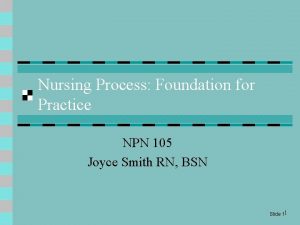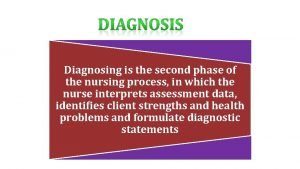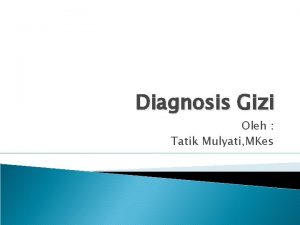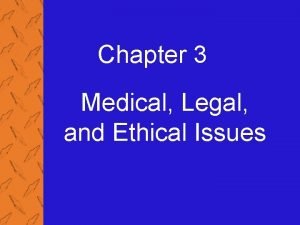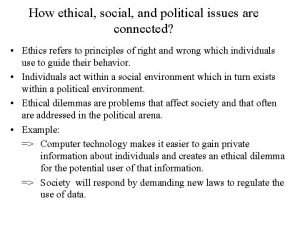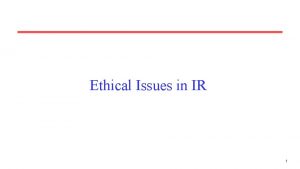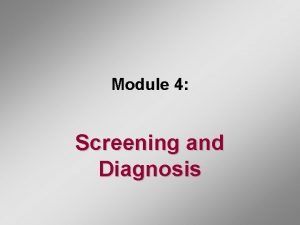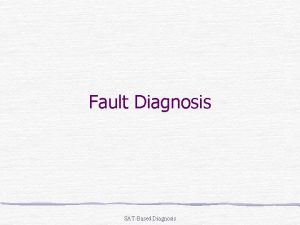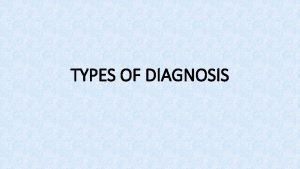Ethical Issues in Diagnosis Northern Arizona University Timothy






































- Slides: 38

Ethical Issues in Diagnosis Northern Arizona University Timothy C. Thomason

Diagnosis is Important • Diagnosis should not be taken lightly. • A diagnosis allows for more efficient communication among clinicians. • A diagnosis has clinical, personal, and social significance. • A correct diagnosis provides a basis for effective treatment.

Potential Negative Consequences of a Diagnosis • A mental disorder diagnosis may make clients feel bad about themselves. • A diagnosis may have negative consequences if it provokes reactions from the client’s insurance company or employer. • There may be social stigma if other people become aware of the diagnosis.

Potential Positive Consequences of Making a Diagnosis • Clients may feel relieved that their problem is known and has a name and a treatment. • Clients can usually use health insurance to pay for the treatment of their disorder if there is a diagnosis. • A correct diagnosis often provides the clinician with a basis for treatment.

Most Common Malpractice Claims Against Psychologists • • Sexual violations Incompetence regarding a treatment plan Loss from evaluation Breech of confidentiality Improper diagnosis Suicide Other - from Pope & Vasquez

APA Ethical Principles (2003) Principle A: Beneficence and Nonmaleficence “Psychologists strive to benefit those with whom they work and take care to do no harm. ”

Refraining From Making a Diagnosis Since the goal of treatment is “the welfare and protection of the individual” and “to benefit clients and “to do no harm, ” in some cases it is ethical to refrain from making a diagnosis (even if the client has a mental disorder).

Results of a Survey of ACA Members (2011) 55% said that refraining from making a diagnosis to protect a client from a third party (e. g. , employer who might demote a client) is ethical 45% said it is unethical

ACA Code of Ethics (2014) “Counselors take special care to provide proper diagnosis of mental disorders. Counselors may refrain from making and/or reporting a diagnosis if they believe that it would cause harm to the client or others. Counselors carefully consider both the positive and negative implications of a diagnosis. ”

APA Ethical Standards 3. 04 “Psychologists take reasonable steps to avoid harming their clients. . . and to minimize harm where it is foreseeable and unavoidable. ”

Consequences of Refraining From Making a Diagnosis • The client may avoid the potential stigma of having a diagnosis in their medical record. • The client’s treatment may not be reimbursable by a third-party payer. • The client may decide not to get treatment. • The client’s mental disorder may get worse.

APA Ethical Principles Principle C: Integrity “Psychologists seek to promote accuracy, honesty, and truthfulness in the. . . practice of psychology. ” “Psychologists do not. . . engage in fraud, subterfuge, or intentional misrepresentation of fact. ” Implication: Diagnoses should be as accurate as possible.

APA Ethical Principles, cont. 4. 02 “Psychologists discuss with clients. . . the relevant limits of confidentiality and the foreseeable uses of the information generated through their psychological activities. ” Implication: Psychologists should discuss the diagnosis they are considering before recording it.

APA Ethical Principles, cont. 9. 03 “Psychologists obtain informed consent for assessments, evaluations, or diagnostic services. . ” “Informed consent includes an explanation of the nature and purpose of the assessment, fees, involvement of third parties, and limits of confidentiality. . ”

Ethics & Managed Care • Prior to the first interview, ask the client to check on their insurance re. psychotherapy. • Discuss the provisions and limitations of the patient’s insurance at the first interview (if they want to use their insurance to pay for therapy). • If coverage is denied, discuss options (e. g. outof-pocket payment, reduced fee, pro bono services, referral to a community agency, etc. ).

Examples of V-Code Conditions • These conditions and problems are not mental disorders and may not be reimbursable. – Parent-child relational problems – Relationship stress with spouse or partner – Uncomplicated bereavement – Being a victim of child abuse – Being a victim of spouse or partner maltreatment – Educational or occupational problems

V-Code Conditions, cont. • Homelessness, poverty • Phase of life problem (adjusting to a life transition such as getting married) • Being the victim of a crime • Sex counseling • Spiritual or religious counseling • Child or adolescent antisocial behavior • Overweight or obesity

Up-Coding • Up-coding is over-diagnosing. • Since insurance companies may not pay for treatment for certain conditions that are not mental disorders, clinicians may be tempted to adjust diagnoses so they are reimbursable.

Up-Coding by Physicians • “Calling an illness by a more insurable name is a common practice. ” - Time Magazine • Research shows that more than 50% of physicians admit to falsifying bills in order to make a patient’s visit reimbursable. • About 10% of all money spent on health care in the U. S. is due to fraud.

Up-Coding is Common • The United States loses about $100 billion to health care fraud each year. About $20 billion of this is due to mental health care fraud. • “I have frequently seen psychiatrists diagnose patients with a range of psychiatric disorders that are not justified, to obtain insurance reimbursement. ” • Mark Schiller, President, American Association of Physicians and Surgeons

Up-Coding is Common • Survey research has shown that most counselors and psychologists have changed or would change a client’s diagnosis in order to qualify for additional managed care reimbursement.

Excerpt from Counseling Today • Some clinicians list an “adjustment disorder” for almost every client under the rationale that it is the most benign diagnosis that is eligible for reimbursement. • This is contrary to ACA ethical standard E. 5. “Professional counselors simply do not misdiagnose on purpose. ”

Excerpts from Articles in the Popular Press “I will give you a diagnosis of a disorder covered by your insurance company so I can get paid. ” • Ten Secrets Your Therapist Won’t Tell You “I’ll exaggerate your diagnosis to get you covered. ” • Ten Things Your Therapist Won’t Tell You “I might exaggerate a diagnosis to get an insurance company to pay for more coverage. • 13 Things our Therapist Won’t Tell You

From Confessions of a Therapist: “Insurance companies require a diagnosis to pay for your sessions. If you’re lucky, they’ll accept a soft diagnosis like Adjustment Disorder. But many insurance companies are on to that trick. They require more severe diagnoses. ” “Couples relationship issues, parent/child troubles, and normal grieving are usually NOT covered. So your therapist will have to slap at least one of you with a diagnosis just to get paid. ”

John Grohol - Psych. Central “Without a diagnosis, therapist won’t get paid by the insurance company. ” You would be hard pressed to find a therapist who worked for a practice that took private insurance who did not make a diagnosis just so they could get reimbursed. Especially common is calling an ‘adjustment disorder’ a ‘major depression, ’ since the former is not reimbursed while the latter is. This is not a practice easily caught. ”

Down-Coding • Diagnosing a less severe disorder than the client actually has. • Avoiding diagnosing certain disorders, such as personality disorders, because they are unreimbursable.

Adjustment Disorder “I diagnosed almost everybody with adjustment disorder because I didn’t want to hurt them. ” - Psychologist Dana Ackley “I use the diagnosis Adjustment Disorder. It means you are having trouble adjusting to your life. That can apply to almost anybody. ” - Anonymous psychologist

Criteria for Adjustment Disorder There are clinically significant emotional or behavioral symptoms in response to a recent identifiable stressor. There is significant impairment in social, occupational, or other important areas of functioning. There is marked distress that is out of proportion to the severity or intensity of the stressor.

Re. Intentional Misdiagnosis “A patient might ask for a less damaging diagnosis for fear that employers or others might find out. Or psychologists may consider exaggerating diagnoses to justify more visits to insurers. No matter what, don’t do it. Honesty is the best policy. ” • APA Monitor on Psychology (Smith, 34(1), 2003).

Up-Diagnosing is Mis-Diagnosing • Psychologists who up-diagnose may have good intentions (making the client eligible for treatment) but it is still unethical and illegal. • The consequences of an incorrect diagnosis are worse for the client than the consequences of a correct diagnosis.

Diagnosing for Dollars “Counselors and clients may agree to submit inaccurate mental health diagnoses that are reimbursable so that clients can receive counseling. This has been called “diagnosing for dollars. . This is considered health care fraud. ” “Intentional misdiagnosis clearly is not in the client’s best interest. Braun & Cox, 2005

“Do not falsify or misrepresent any information or facts regarding insurance claims and cost reimbursement. This includes intentionally misdiagnosing mental disorders, upcoding, double billing, etc. ” Braun & Cox, 2005

Ethics & Diagnosis • Intentional misdiagnosis of mental disorders for insurance reimbursement is a violation of the APA code of ethics. • It is also considered health care fraud and is illegal and can result in incarceration.

Examples of Health Care Fraud • Florida psychologist Lawrence Duran a chain of mental health clinics and made up diagnoses for clients to make them eligible for therapy. He was sentenced to 50 years in prison. • Utah psychologist Charles Mc. Cusker was indicted for $1. 3 million in health care fraud for billing for therapy services not provided. • A Miami psychiatrist got 30 years in prison for Medicare fraud.

Examples of Health Care Fraud Psychologist Irwin Greenbaum pled guilty to health care fraud. He lost his license to practice, had to pay $14, 351 as restitution, and got 30 days in prison. His crime was billing Blue Cross for individual psychotherapy sessions when the actual service was group therapy.

Examples of Health Care Fraud • Missouri psychologist Rhett Mc. Carty was sentenced to three years in federal prison after he was convicted of submitting claims to Medicare for over $1 million worth of psychotherapy sessions which were not provided. • Dallas psychologist Michael Wolf was sentenced to three years in prison for submitting claims for psychotherapy sessions which were not provided.

Recommendations • Strive to make your diagnoses accurate. • Do not over-diagnose or under-diagnose. • Do not falsify or misrepresent any information regarding insurance claims and reimbursement. • At the first session, discuss the regulations and limitations of insurance service provisions.

Recommendations, cont. • If coverage for the client’s therapy is denied, discuss options (out-of-pocket payment, reduced fee, pro bono services, referral to a community agency, etc. ). • Maintain your professional liability insurance. • Advocate for insurance reforms so that all DSM diagnostic codes (and V-codes) are accepted for insurance reimbursement.
 Nau family housing
Nau family housing Bblearn nau
Bblearn nau Dual diagnosis ireland
Dual diagnosis ireland Nursing process
Nursing process Medical diagnosis and nursing diagnosis difference
Medical diagnosis and nursing diagnosis difference Second phase of nursing process
Second phase of nursing process Nursing process objectives
Nursing process objectives Perbedaan diagnosis gizi dan diagnosis medis
Perbedaan diagnosis gizi dan diagnosis medis Arizona state university geology
Arizona state university geology Arizona state university
Arizona state university University of arizona emergency medicine
University of arizona emergency medicine Csc 110 university of arizona
Csc 110 university of arizona Bnad 276 university of arizona
Bnad 276 university of arizona Perbedaan ethical dilemma dan ethical lapse
Perbedaan ethical dilemma dan ethical lapse Army ethical lenses
Army ethical lenses Perbedaan ethical dilemma dan ethical lapse
Perbedaan ethical dilemma dan ethical lapse The perceived relevance or importance of an ethical issue
The perceived relevance or importance of an ethical issue Legal and ethical issues in use of ict
Legal and ethical issues in use of ict Ethical issues in entertainment media
Ethical issues in entertainment media Legal ethical and societal issues
Legal ethical and societal issues Legal, social, ethical and professional issues in computing
Legal, social, ethical and professional issues in computing Ethical issues of e commerce
Ethical issues of e commerce Legal and ethical issues in computer security
Legal and ethical issues in computer security Professional and ethical issues during internship
Professional and ethical issues during internship Itgs social ethical issues
Itgs social ethical issues Ethical issues in accounting
Ethical issues in accounting Experimental design and ethical considerations
Experimental design and ethical considerations Ethical issues in group counseling
Ethical issues in group counseling Ethical issues in accounting
Ethical issues in accounting Nike accused of tolerating sweatshops
Nike accused of tolerating sweatshops Moral dimensions of information systems
Moral dimensions of information systems Chapter 2 ethical and legal issues
Chapter 2 ethical and legal issues Ethical and social issues in information systems doc
Ethical and social issues in information systems doc Medical legal and ethical issues chapter 3
Medical legal and ethical issues chapter 3 International business ethics definition
International business ethics definition Chapter 3 ethical and legal issues
Chapter 3 ethical and legal issues Legal and ethical issues in computer security
Legal and ethical issues in computer security How ethical social and political issues are connected
How ethical social and political issues are connected Ethical issues in treating lgbt patients
Ethical issues in treating lgbt patients




